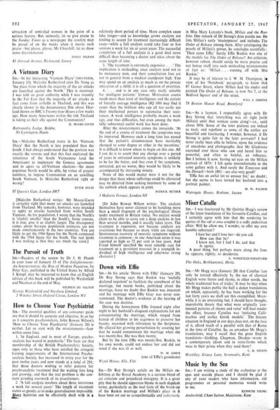How to Choose Your Psychiatrist SIR.—The essential qualities of any
consumer guide are that it should be accurate and objective. In so far as it concerns psychoanalysis, John Rowan Wilson's 'How to Choose Your Psychiatrist' (January 20) is neither. Let us start with the misstatements—four within seven lines.
1. 'In England, and in most of Europe, psycho- analysis has waned in popularity.' The facts are that membership of the British Psychoanalytic Society, open only to those who have satisfied the stringent training requirements of the International Psycho- analytic Society, has increased in every year for the past twelve years and now stands at a total of 291; that those doctors wishing to refer patients for psychoanalytic treatment find the waiting lists long and growing; and that the real problem is the con- stant grinding overwork of its practitioners.
2. 'A full analysis involves about three interviews a week for several years.' The length of treatment varies so greatly as to make generalisation impossible. jelay hysterias can be effectively dealt with in
relatively short period of time. More complex cases take longer—and as knowledge grows analysts are tending to accept for treatment increasingly difficult cases—while a full analysis could take four or five sessions a week for six or seven years. The successful completion of a full analysis is a good deal more difficult than becoming a doctor and takes about the same length of time.
3. 'The treatment is extremely expensive . . .' The implication is misleading, since analysts tend not to be mercenary men, and their consultation fees are not in general from a medical standpoint high. You may spend on an analysis as much as on the private education of a child; it is all a question of priorities.
4. '. . . and is in any case only really suitable for intelligent patients.' Untrue. Motivation counts much more than level of intelligence and the patient of literally average intelligence (IQ 100) may find it easier than the brilliant who can all too easily use their intellectual powers to rationalise their resis- tances. A weak intelligence probably means a weak ego, and thus difficulties, but even among the men- tally subnormal useful work has been done.
After the misstatements comes the innuendo. 'At the end of a course of treatment the symptoms may be improved. However such a long time has passed that the patient's circumstances have inevitably changed to some degree or other in the meantime.' It is difficult to know where to begin on this one. All I can do is to assert that any change over a period of years in untreated neurotic symptoms is unlikely to be for the better, and that even if the symptoms, untreated, got no worse, they would be likely to be accompanied by increasing misery.
None of this would matter were it not for the danger that those whose sufferings could be alleviated may be deterred from seeking treatment by some of the rubbish which appears in print.
PATRICK HUTBER
3 Malvern Terrace, London N8
[Dr John Rowan Wilson writes: The analysts themselves have never claimed to be handling more than a small fragment of the psychological illness under treatment in Britain today. No analyst would claim to be able to carry out a deep analysis in less than several months, and it usually takes years. The treatment is expensive, not because analysts are avaricious but because so many visits are required. Spontaneous recovery of neurotic symptoms without treatment is common—in one American series it was reported as high as 72 per cent in two years. And Freud himself specified the most suitable case for treatment as a persistent neurosis in a youngish in- dividual of high intelligence and otherwise strong character.]


































 Previous page
Previous page